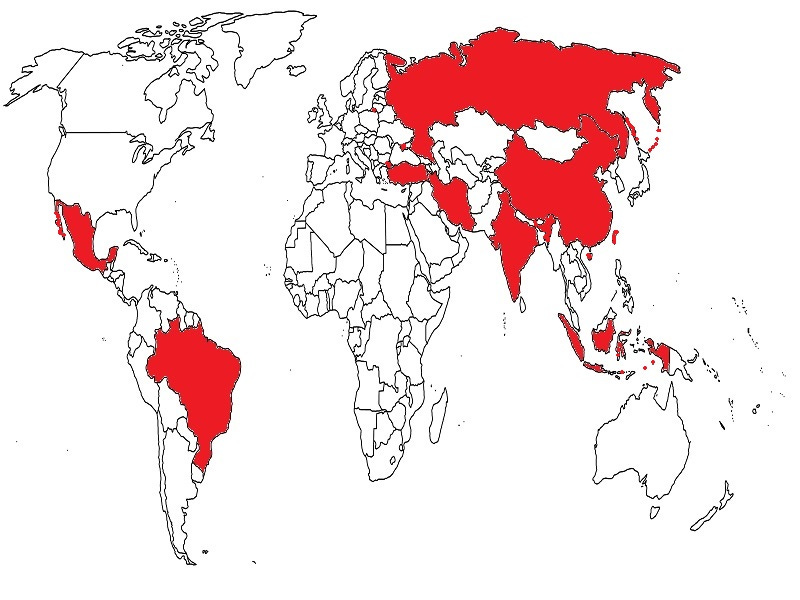As it objectively stands, Russian Duma Speaker Volodin’s figures are correct: the Big Eight does indeed outcompete the G7 by a large margin. From this fact, observers can expect the global systemic transition to further accelerate as those multipolar leaders work more closely together to construct a non-Western model of globalization that stops the Golden Billion’s plundering of the Global South’s resources.
One of the top trends of the New Cold War is the bifurcation of the world into the Golden Billion and the Global South, which President Putin regards as colonies and sovereign states respectively. Duma Speaker Volodin also noticed this too, which he elaborated upon in a recent Telegram post that RT just brought to the attention of its readers. According to him, “The group of eight countries not participating in the sanctions wars – China, India, Russia, Indonesia, Brazil, Mexico, Iran, Turkey – in terms of GDP at PPP is 24.4% ahead of the [G7]”, whose economies are continuing “to crack under the weight of sanctions imposed against Russia.” He concluded that “The United States created the conditions with its own hands for countries wishing to build an equal dialogue and mutually beneficial relations to actually form a ‘new Big Eight’ together with Russia.”
This insight is integral to understanding the global systemic transition to multipolarity that’s unprecedentedly accelerated as a result of Russia’s ongoing special military operation in Ukraine and the US-led West’s completely counterproductive anti-Russian sanctions that were promulgated in response. Instead of comprehensively reasserting the US’ declining unipolar hegemony, the Golden Billion’s moves have comprehensively facilitated the rise of the Global South that’s challenging the powers-that-be for control of the world system. The first-mentioned wants to retain as much of the previous one as possible while the second are actively working to gradually reform it so that everything is more equitable, just, and stable.
As it objectively stands, Volodin’s figures are correct: the Big Eight does indeed outcompete the G7 by a large margin. From this fact, observers can expect the global systemic transition to further accelerate as those multipolar leaders work more closely together to construct a non-Western model of globalization that stops the Golden Billion’s plundering of the Global South’s resources. That will in turn speed up the decline of the US-led West, though it’s also predicted that America won’t peacefully let this process unfold. To the contrary, it’ll certainly order its neo-imperial colonies to dispatch their troops across the Global South (and especially [West] Africa) as part of the proxy wars that the US is expected to provoke there in a desperate attempt to retain privileged access to those countries’ resources. This can lead to states like Ethiopia, Mali, and even Nigeria becoming New Cold War battlegrounds.
Moreover, it should also be expected that more “lawfare coups” like the one that arguably took place in Pakistan against former Prime Minister Khan as punishment for his independent foreign policy will always remain a threat to the Big Eight. The US would like to “poach” those important countries from the multipolar bloc that’s quickly coalescing and will stop at nothing in replicating the “Pakistani precedent” against them in its own way that’s tailored to each of their unique domestic circumstances. China, India, and Iran are more immune to this scenario than Brazil, Indonesia, Mexico, and Turkey, but they’re all in one way or another vulnerable to American destabilization campaigns, though that also doesn’t automatically mean that such attempts will succeed. The more that the comprehensively work together within the Big Eight, the greater the odds are that they’ll foil every regime change scheme.





Brazil is a sticky one. The best "Soviet watcher" is to interpret Brian Winter and America's Quarterly which although the mouthpiece for corporations for over 70 years is also following the obligatory "WOKE " light.
Brian's tweets indicate that Bolsonaro may try to pull a Trump. That tells a lot of what the Wilson institute (heavily influenced by Moro ) thinks.
I suspect most corporations in the US may be spooked enough by Boric as well as their failure in Bolivia to not attempt to sabotage Bolsonaro too much.
Never underestimate that the state department and democrats are less then pleased over his visit to Russia as well as not jumping into "NATO" non member status.
Logical thinking is that decision makers in the corporate sector will keep the political end of the US in check on this one.